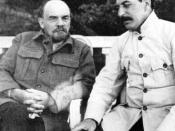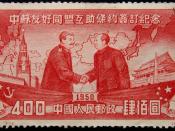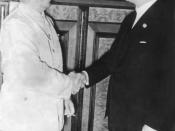I disagree with the claim that Stalin brought his country and his people nothing but harm. While Stalin is indeed remembered for his 'malicious' takeover of central and eastern Europe, the Man of Steel had numerous successful as well as unsuccessful domestic policies between 1929 to his death.
Stalin understood as early as 1928 that the Soviet economy lagged behind the rest of Europe. For this reason he began implementing the 5 year plans, under which goals would be set out for each industry including agriculture, which the proletariet would then have to meet. This modernisation drive to make the economy strong and capable of supporting a future war was admirable, and benefited the population. However, the zest with which the plans were carried out led to negative side-effects. Firstly, the primitive measures carried out against those who failed to comply with the set targets were sent to gulags where death was almost certain.
Out of this fear corruption blossomed like festering weeds. Figures were altered to make it appear that targets were in fact being exceeded and none dared draw attention to the fact that many of the goals were indeed impossible to ever hope to match. This in turn hurt the economy because the growth was a lie. For this yes, yes, Stalin harmed his people. But on many levels the plans were successful. The production of coal grew 6-fold, that of steel 3-fold, and agricultural output also grew. However, most of the growth was experienced on an industrial level, and consumer industries were ignored. There was little incentive to work industrially if the only thing one could buy was heavy machinery. Stalin's domestic economic policy did, therefore, have important positive effects by developing it and clearing away the chaos that occurred after the revolutions and turmoil...



Bizarre take on a demented man
You wrote a fascinating soviet-style commentary on what history sagaciously records to have been an asshole of the highest calibre. I salute you!
3 out of 7 people found this comment useful.